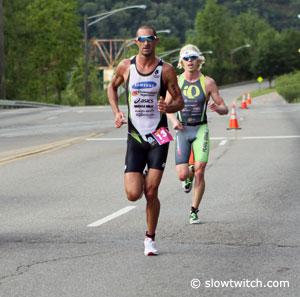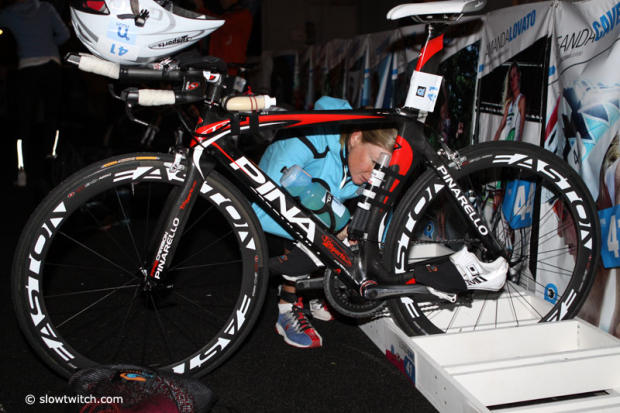The world of Brian Fleischmann
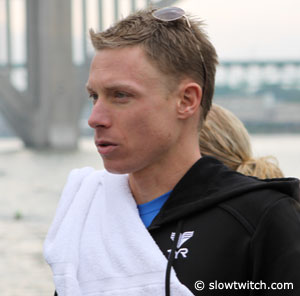
Brian Fleischmann has been racing as a professional for over a decade. He has raced the ITU World Championship Series, 70.3 World Championships, Rev3 events and the new 5150 series. Now in his 11th year, he is stronger than ever. Here he discusses his past, present and future.
Slowtwitch: Thanks for the time Brian.
Brian Fleischmann: No problem, my pleasure.
ST: So far this season you’ve put up multiple top 10 finishes in the 5150 series and Rev3 races. Generally happy with the way things are going so far?
Brian: Yes and no. I have had some decent races including Rev 3 Costa and Knoxville as well as Memphis 5150 and Roatan ITU. I have also bombed a few including St. Anthony's and Miami 5150, so it has been mixed emotions for me. I was able to come back home from some of my early season unsuccessful performance and straighten up my bike split, which essentially was what was letting me down. I have been able to see improvement thus far and turn the performances around a bit although there is still some work to be done there. There is a lot of racing left to go this season, which I am looking forward to.
ST: Do you have a major focus for 2011?
Brian: I would have to say that I have put some emphasis on the early season Rev3 series races as well as qualifying and competing well in Hy-Vee 5150 Championships. For the first half of the season my goal was to get in some consistent training while racing well enough to qualify for Des Moines. My approach to the second half of the season will be to pull back on the number of races and focus more on peaking for specific events including Des Moines and some later season 70.3 events as well as Rev3 South Carolina.
ST: I'm guessing the Olympics isn't really your thing?
Brian: Yes, it absolutely is. I love the Olympic Games and the ITU. One of my proudest moments was walking in the opening ceremonies at the 2007 Pan American Games in Rio and winning the 2006 ITU Team World Championships. Financing an Olympic ITU points chase and traveling the globe provides a unique challenge and is very rewarding when the proper sacrifices are made and the plan works out. The ITU is a four year process that I am very familiar with. I look to make a push to be on the start line for the US Olympic Trials races that will take place in 2012.
ST: You mentioned you we’re focusing on Hy-Vee. What are your thoughts there? There’s a million dollars at stake in that race.
Brian: I like what Ric Jurgens of Hy-Vee has done in the past with the event with the ITU format and I am sure the Ironman 5150 event will be on the same level. The enthusiasm that the Hy-Vee Grocery Store CEO, Ric Jurgans, exhibits towards the production of the Hy-Vee Triathlon has the ability to transform the sport. Although triathlon is growing, it is still in its infancy as far as publicity including TV coverage. For the sport to become more mainstream in the US it will take more events like Hy-Vee backed by large corporate sponsors. As far as the race itself goes, I like the fact that the course will once again go through downtown Des Moines which will provide some legitimate undulation on both the bike and run. Should bring out the best in everyone on the day.
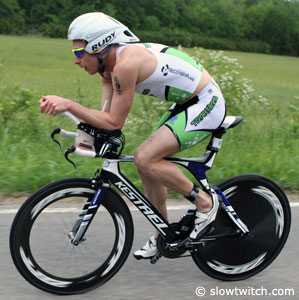
ST: Do you think there is potential for other races to follow Hy-Vee's lead in terms of exposure, mainstream appeal and prize money?
Brian: Absolutely, I think it will take unique race destinations with motivated race directors that are willing to put in the groundwork to make the race a world class event similar to a Hy-Vee or Escape From Alcatraz, etc. It will also take sponsors that realize the potential and value of sponsoring major triathlon events that will showcase their products well. Without any research, I would have to say that sponsoring a triathlon would be much less expensive and much more cost effective then sponsoring events such as a golf tournament or tennis championships, so the value is there. There are really endless possibilities across the board from short course events in major cities as well as long course races in vacation destinations. With the sport growing and a little creativity, I do not see why there can't be multiple major million dollar prize purse events throughout the US within the next decade.
ST: How has the Rev 3 series treated you?
Brian: Great! The Rev 3 triathlon series is in its third year as a series with Charlie Patten putting on great events with some really cool destinations like Costa Rica, Portland, etc. The atmosphere at the Rev3 events has a great low key vibe to it which makes for a great race experience.
ST: Rev3 has done pretty well for itself in the past few years. They've grown to 5 domestic races and one in Costa Rica now.
Brian: It is great to see the Rev3 series take off like it has. Charlie has worked hard and it is beginning to pay off and will only get larger and more popular in the coming years.
ST: You first raced pro in 2001. What changes have you seen in the sport in those 10 years?
Brian: So much has changed, yet so much has stayed the same. As cliche as that may sound, it's true. I feel that in current times, the depth has risen ten-fold while the performances that are winning big races has risen as well to some extent, but mainly the depth at the top has been the main game changer. There are more athletes fighting it out at the top. The growth of the sport has increased tremendously over the last decade which is great to see while advancements in training and technology has increased the performance level in professional and age group athletes across the board.
ST: What about racing opportunities for pros? I feel like there are more series and distances available than ever.
Brian: Yes, there are a lot of races these days in both short course and long course triathlon, especially in the US. As a professional athlete you have to pick your battles wisely to maximize performance. One big mistake that I have made in the past is trying to do too much. With multiple races on almost every weekend from March through November one could race themselves into a coma going for the glory every weekend. Making a realistic race plan including early/mid and late season training months/blocks with little mini breaks and sticking to it is the key.
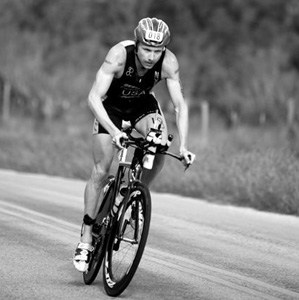
ST: Would the Brian Fleischmann of 2011 beat the Brian Fleischmann of 2001?
Brian: Yes, absolutely. I am swimming about 1.5-2 minutes minutes faster in a 1500 meter swim and riding about 5-6 minutes faster in a 40K. In 2001 I could lose time on the swim and sit in on the chase group on the bike in an ITU drafting race and run a 33 minute 10 K to do well in major races. Today, there is a lot more talent out there and my performances then would not even contest with what I can do now. What was passable then does not cut it now. A lot of young talent and depth has entered the sport over the last decade and the sport will only keep getting better and faster which is what keeps me going and pushing year after year. The US has young up and coming athletes like Lukas Verzbicas and other young talent coming up in which the sky is the limit for them in the sport. As long as they stay motivated and play their cards correctly it would not be too much of a speculative statement to say that these up and coming athletes can be champions of the world one day soon enough.
ST: Now let’s talk training and racing. At the Memphis in May Cam Dye beat you by a few tenths of a second but it wasn't a sprint finish because of the time trial start. I'm sure that would have been a spectacular finish had you two been side by side.
Brian: Yes, it is always tough to lose close races. I gave Memphis In May 100% and Cam has been having a great season this year so I have no regrets about the race. The Memphis In May Triathlon has been around since the early 80s and is a classic race which provides an interesting time trial start dynamic. The best way to race Memphis in May is to just go as hard as you can and avoid thinking about where the contenders are in the race as it unfolds. We were all fortunate that the race took place with the lightning and rain that occurred all morning prior to the delayed start of the race.
ST: You and Cam each ride a Kestrel 4000 and have been crushing bike courses without mercy this season. It must be a pleasure to ride that.
Brian: Cam has been setting the bar as far as the bike splits have gone this season. Limiting the damage on bike to Cam is the game that everyone has to play with him on the bike. We are both on the same Kestrel 4000 which is the best bike in the industry so no excuses. I roomed with Cam at the Miami 5150 earlier this year where he put 3.5 minutes on me on the bike. After the race and back at the hotel room we were both able to laugh it off. All in good fun I suppose. Now I am able to focus more during the agonizing interval sessions in training on the bike thanks to Cam for handing it to me on the bike thus far this season.
ST: On a scale of 1-10 how hard do you push it on each leg of a race?
Brian: 10/10 and 10. It is not a race if I am not pushing 100%. I can't compete with the best with less than 100% so I push.
ST: That sounds pretty grueling.
Brian: One can argue that triathlon is a fairly painful sport I suppose.
ST: What are your SBR staple workouts?
Brian: As far as training during a training block I key on descending hill tempo intervals on the run with similar sessions on the bike including one or two pack rides a week to keep the fun factor going as well as one long run a week which typically includes some mid range intensity. I swim 5-6 times a week which helps out with my overall fitness level although I have found that over swimming detracts from my bike and run training. Low stress short intervals is the theme prior to races. Short one minute hill reps on the bike and even shorter intervals on the run with some solid swim sessions during race week. Short and sweet is the theme for pre race week. Timing workouts, recovery and meals is absolutely the most critical component to my training and I am forever trying to improve upon the timing aspect. There is an art to training with three sports and timing everything properly will forever be the most challenging and tricky aspect to the sport which is what really makes the sport enjoyable.
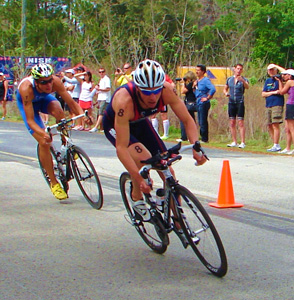
ST: How do you fuel up for a race?
Brian: I practice my fueling in training every day of the week so come race morning, I just stick to what I would eat prior to any other workout in the morning such as swim practice, etc. I have been bringing a blender to races with me for the past few years so I am able to make a shake in the morning prior to races. It usually includes, ice, coffee, half of a banana, and First Endurance Cappuccino Ultragen. For half Ironman events I ingest two flasks of First Endurance Liquid Shot throughout the bike and run. Simple and easy to digest liquid calories.
ST: Looking forward, will you race the rest of the USAT Elite Race Series?
Brian: I am planning on Monroe, WA and Pro Nationals in Buffalo.
ST: What's next on your schedule?
Brian: Monroe, WA ITU and Boulder Peak 5150.
ST: Brian, best of luck and it’s been a pleasure
Brian: Thanks for the opportunity.
You can learn more about Brian here: http://trakkersgps.com/athletes/brian-fleischmann/


